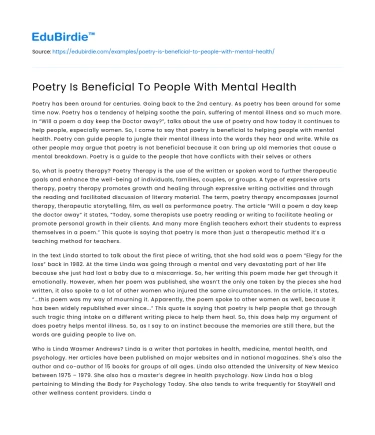Introduction
In recent years, the exploration of creative arts as a therapeutic tool has gained significant momentum, with poetry emerging as a particularly potent medium for enhancing mental health. The intricate interplay of emotions, thoughts, and language inherent in poetry offers distinctive benefits that resonate deeply with individuals grappling with mental health issues. Poetry provides a dual function: as a means of expression and a therapeutic tool that facilitates emotional processing and healing. This essay delves into the ways poetry supports mental well-being, drawing on academic research and anecdotal evidence to underscore its efficacy. By examining the psychological benefits of poetry, its role in emotional regulation, and its capacity to foster self-awareness and empowerment, this paper aims to elucidate the unique contributions of poetry to mental health care. Furthermore, it will address counterarguments and potential limitations to present a balanced perspective on the subject.
Psychological Benefits of Poetry
Poetry serves as a profound psychological tool, offering individuals a means to articulate complex emotions and experiences that might otherwise remain unexpressed. According to Pennebaker and Seagal (1999), expressive writing, which includes poetry, can significantly reduce stress and improve mental health outcomes by helping individuals process traumatic experiences. Poetry's structured yet flexible form allows for the expression of nuanced emotions, providing a safe outlet for individuals to confront and explore their internal landscapes. For instance, poetry therapy, a form of expressive therapy, has been shown to alleviate symptoms of depression and anxiety by enabling individuals to externalize and process their feelings in a supportive environment (Mazza, 2016).
Save your time!
We can take care of your essay
- Proper editing and formatting
- Free revision, title page, and bibliography
- Flexible prices and money-back guarantee
Moreover, poetry's rhythmic and metaphorical elements can enhance cognitive processing and emotional understanding. The use of metaphor in poetry allows individuals to view their experiences from different perspectives, fostering insight and emotional clarity. A study by Bonanno and Burton (2013) highlighted that individuals who engaged in metaphorical thinking through poetry experienced greater emotional resilience and adaptability. Thus, poetry not only aids in emotional expression but also enhances cognitive flexibility, enabling individuals to navigate their mental health challenges more effectively.
Transitioning from exploring the psychological benefits of poetry, it is also crucial to consider its role in emotional regulation and empowerment. By providing a structured framework for expressing emotions, poetry can play a pivotal role in helping individuals regulate their emotional responses and foster a sense of control over their mental states. This, in turn, contributes to a more holistic approach to mental health care.
Emotional Regulation and Empowerment Through Poetry
Emotional regulation is a critical component of mental health management, and poetry offers a unique avenue for cultivating this skill. The act of writing poetry requires individuals to slow down and reflect on their internal experiences, promoting mindfulness and self-awareness. This reflective process can help individuals identify and articulate their emotions, leading to improved emotional regulation. A study by Smyth et al. (2008) found that individuals who engaged in expressive writing, including poetry, reported increased emotional awareness and reduced emotional distress.
In addition to fostering emotional regulation, poetry empowers individuals by providing a sense of agency over their narratives. Writing poetry allows individuals to reclaim their stories, transforming painful experiences into sources of strength and resilience. This empowerment is particularly evident in marginalized populations, where poetry serves as a vehicle for voicing their unique experiences and challenging societal norms. For example, the work of poet Audre Lorde exemplifies how poetry can be used as a tool for empowerment and social change, highlighting the therapeutic potential of poetry in fostering not only personal but also collective healing.
As we transition to the next section, it is essential to address potential counterarguments and limitations of using poetry as a therapeutic tool. While poetry offers numerous benefits, it is not a panacea for all mental health challenges. Acknowledging these limitations will provide a more balanced understanding of poetry's role in mental health care and its potential integration into broader therapeutic practices.
Counterarguments and Limitations
Despite the compelling evidence supporting the therapeutic benefits of poetry, it is crucial to recognize potential limitations and counterarguments. Critics may argue that poetry's subjective nature makes it less reliable as a therapeutic tool compared to more structured interventions like cognitive-behavioral therapy. Additionally, not all individuals may find poetry accessible or beneficial, as personal preferences and cultural backgrounds can significantly influence one's receptivity to poetic expression.
Furthermore, the effectiveness of poetry therapy may vary depending on the individual's engagement level and the presence of a supportive environment conducive to expression and reflection. As with any therapeutic intervention, poetry therapy requires skilled facilitation to ensure its benefits are maximized and potential risks, such as emotional overwhelm or re-traumatization, are mitigated. Despite these challenges, the incorporation of poetry into mental health care can be a valuable complement to traditional therapies, offering unique insights and avenues for healing.
Conclusion
In conclusion, poetry stands as a powerful ally in the realm of mental health care, offering a distinctive blend of emotional expression, cognitive insight, and personal empowerment. Through its capacity to articulate unspoken emotions and foster emotional regulation, poetry provides a therapeutic outlet that supports mental well-being. While acknowledging its limitations, the integration of poetry into mental health practices can enhance traditional therapeutic approaches, offering individuals a holistic path to healing. As research continues to explore the intersections of art and mental health, poetry's role as a therapeutic tool is likely to gain further recognition and application, ultimately enriching the landscape of mental health care.






 Stuck on your essay?
Stuck on your essay?

